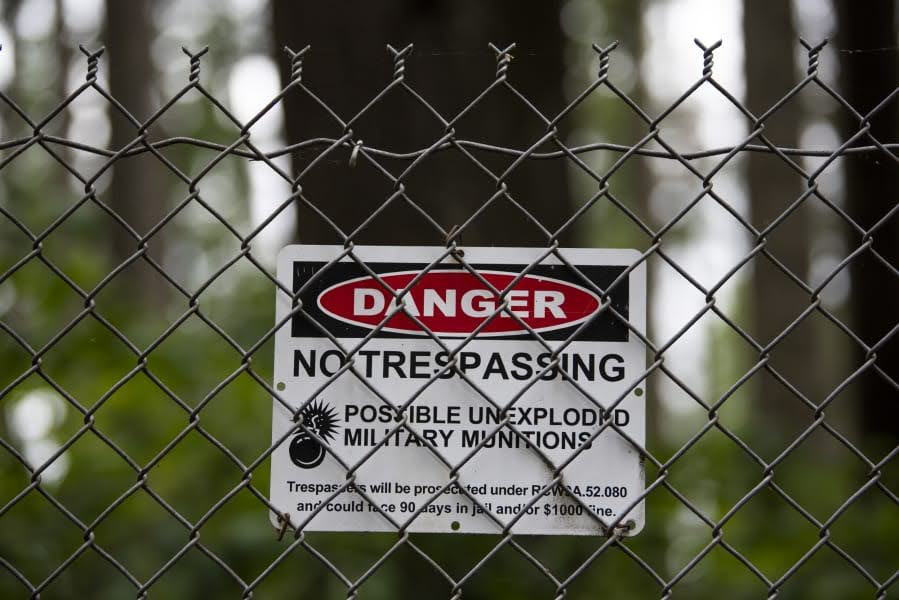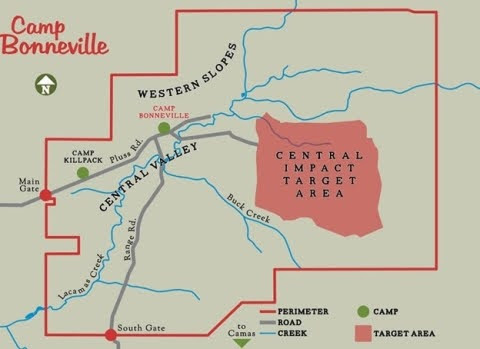Camp Bonneville: Safety, Transparency, and Accessible Parks
Camp Bonneville is a 3,840-acre property located in the foothills of the Cascade Range about 7 miles north of the Columbia River in East County that was used as a military training camp for 85 years.
Currently, it is not open to the public, is largely undeveloped, and over half of it is forested. After acquiring the property in 2006, the county transferred ownership to the Bonneville Conservation Restoration & Renewal Team, LLC, to manage a team of contractors to remove hazardous waste and unexploded ordnance leftover from military training exercises. It was determined that the cleanup was going to be much more extensive and costly than initially thought, so in 2011 Clark County accepted ownership of the cleanup under the condition that the Army provide more funding.
Site Map from the Camp Bonneville Public Works page
Safety Concerns Surrounding the Site
There is serious question about whether cleanup of Camp Bonneville has been adequate, and several discrepancies have been uncovered between what has been presented to the Clark County Council and how cleanup reports actually read. For example, what is known as the Central Impact Targeting Area (CITA), which contains 572 acres and is the most dangerous 15% of Camp Bonneville, has been presented as having been cleaned, including both surface and subsurface. However, the “Site Specific Final Report-Central Impact Target Area and Northern CITA Expansion,” dated January 2021, shows that 455 acres of the CITA were not cleared in any way. Other issues have been raised about the accuracy of staff’s January 10th briefing to the council this year that are of serious concern when it comes to knowing the true extent of the environmental cleanup performed and the state of Camp Bonneville today. This includes outright omissions about the sitewide groundwater issue, the deteriorated roads and trails, any mention of the 2,000 acres that have not been surveyed, and more. Additionally, Friends of Clark County did not find direction from the council to be decipherable when viewing this meeting, which raises even more concerns about transparency with the public.
Additionally, many folks in the community don’t believe the county dug deep enough in their cleanup efforts to ensure full eradication of safety hazards. This includes current Camp Bonneville Citizen Advisory Board members. There is no plan for ordnance removal for much of the acreage of Camp Bonneville, and there are also plumes of buried toxic chemicals whose movements are not being monitored as they approach Lacamas Lake tributaries.
Wildfire is also a potential issue. The Camp Bonneville forest has significant fuel loads, and as the public saw with the Nakia Creek Fire that occurred nearby, wildfires with ample fuel and the right conditions can quickly get out of control. FOCC is concerned that the WA Department of Natural Resources (DNR) does not have the resources to fight these local fires.

Image credit: The Columbian
Parks and Open Spaces: Camp Bonneville is Not Ready for the Public to Enjoy
Clark County’s 2022 Parks, Recreation, and Open Space (PROS) Plan (part of the Comprehensive Plan) is a six-year-strategic roadmap that was developed to ensure the community is provided ample parks, recreation, open space, and trails as required by the Growth Management Act (GMA). The PROS Plan includes a review of current facilities and compares this assessment to community needs, which is then used to set goals in order to achieve the appropriate level of service (LOS) Clark County needs to meet over the 6 year plan. The adoption of the PROS Plan allows the county to receive grant funding through the Washington State Recreation and Conservation Office (RCO).
According to the PROS Plan, Clark County is behind in the amount of public park space it should have in proportion to its population. The LOS standard for regional parks is 10 acres per population of 1,000 residents, with a development standard targeting at least 18% (equivalent to 1.8 acre per 1,000) of each regional park site. Clark County’s regional park acreage totals 2,603.5 acres with 361.1 acres of developed park areas, meaning that the LOS deficit is currently at 2,288.6 acres, with a shortage of 550.8 acres of developed areas. By 2030, the county-wide population is projected to increase to 582,377 residents, which would increase the LOS deficit to 3,220.3 acres.
According to the 2 latest PROS Plan (the most recent completed in 2022), Clark County hopes that the 3,840 acres of Camp Bonneville will help meet this large and widening deficit, but the camp is not nearly ready and poses serious danger to the public because of the unexploded military ordnance (explosives) scattered about since its days as an Army base. As previously mentioned, the amount of acreage actually cleared of hazards is very much in dispute.
Even if Camp Bonneville were safe for public access, the 3,840 acres of parkland would not sufficiently make up the deficit in county parks, recreation, and open space. Additionally, Camp Bonneville is too far from population centers to meet the spirit of the PROS Plan legislation. We need more outdoor areas to enjoy near where people live. Taken together, it is a well-founded concern that Camp Bonneville is being rushed into opening in order to fill the PROS Plan deficit.
Our Position
FOCC insists on a full and deep cleanup of the Camp Bonneville site, which begins with improved transparency and ensuring accurate presentations of the cleanup and other information available to the public and the council. Furthermore, we support Clark County meeting the community need for parks, recreation, and open space outlined in the PROS plan by fairly distributing parks throughout the county near where people live and work, not by counting on Camp Bonneville to make up the acreage deficit. Finally, we call for continued monitoring of groundwater toxic plumes from Camp Bonneville to protect local residents and Lacamas Lake.
Get Involved
You can find out more on the history of Camp Bonneville and the cleanup at the Clark County and WA Department of Ecology’s websites:
Clark County: https://clark.wa.gov/public-works/camp-bonneville
WA DOE: https://apps.ecology.wa.gov/cleanupsearch/site/11670

